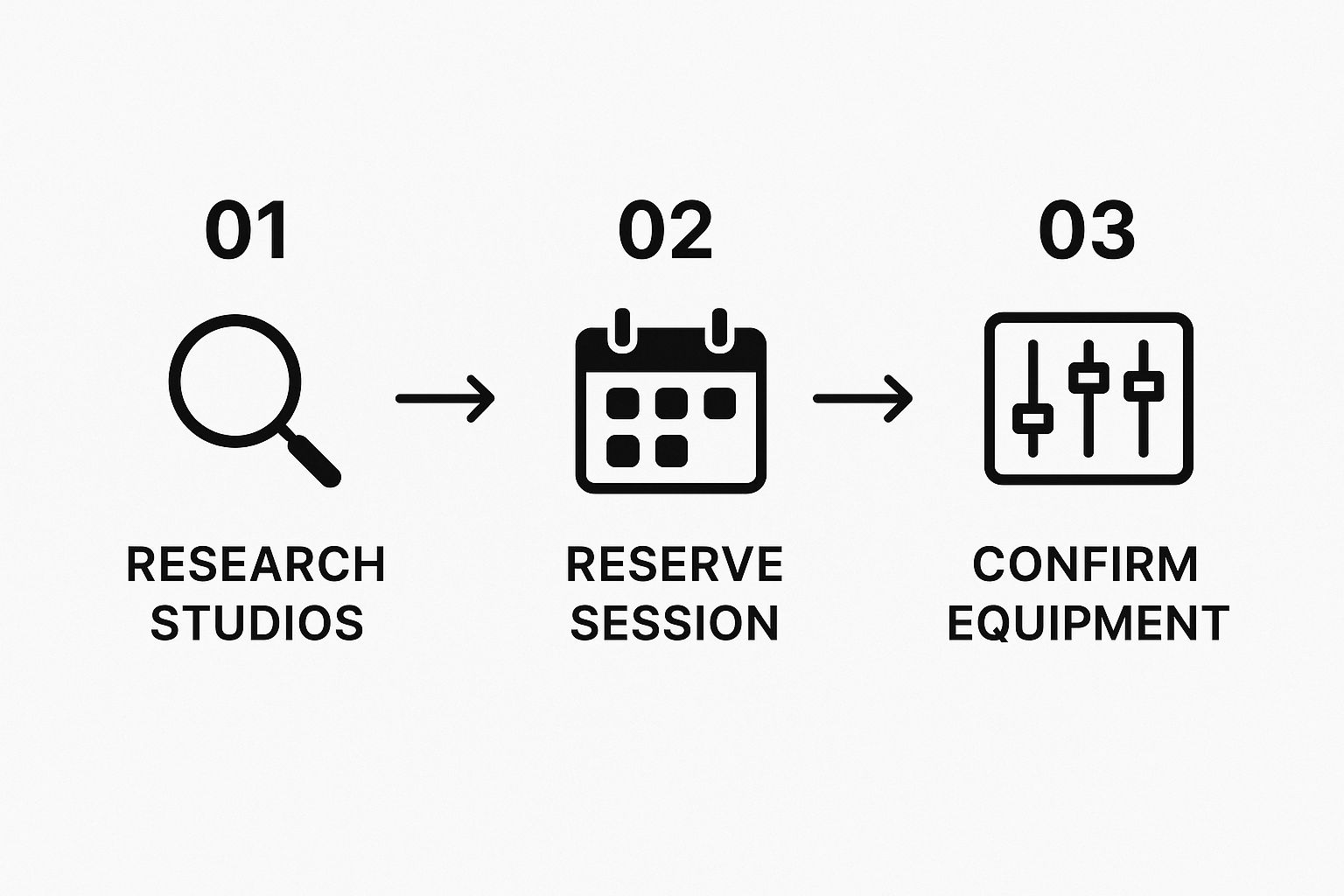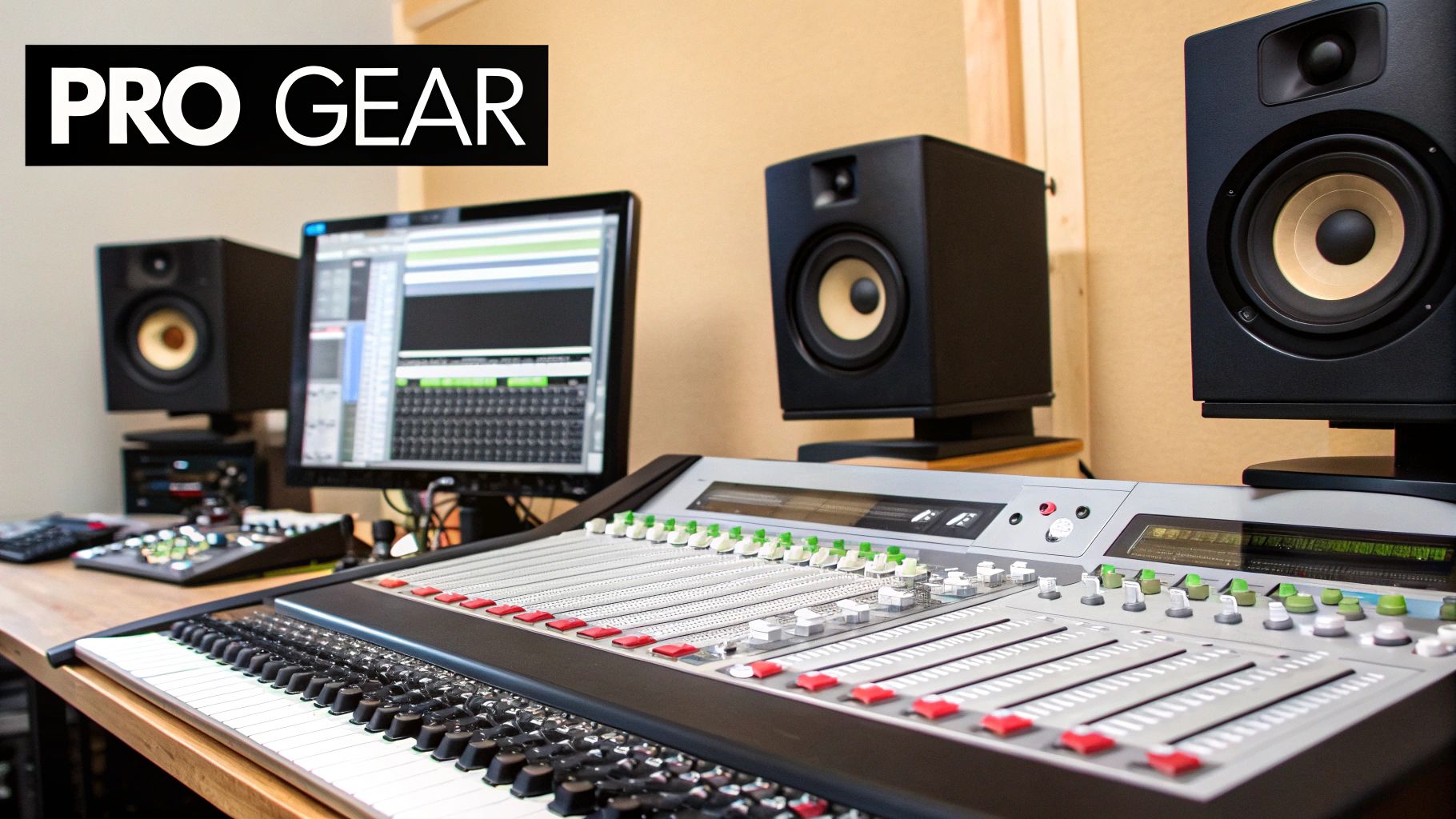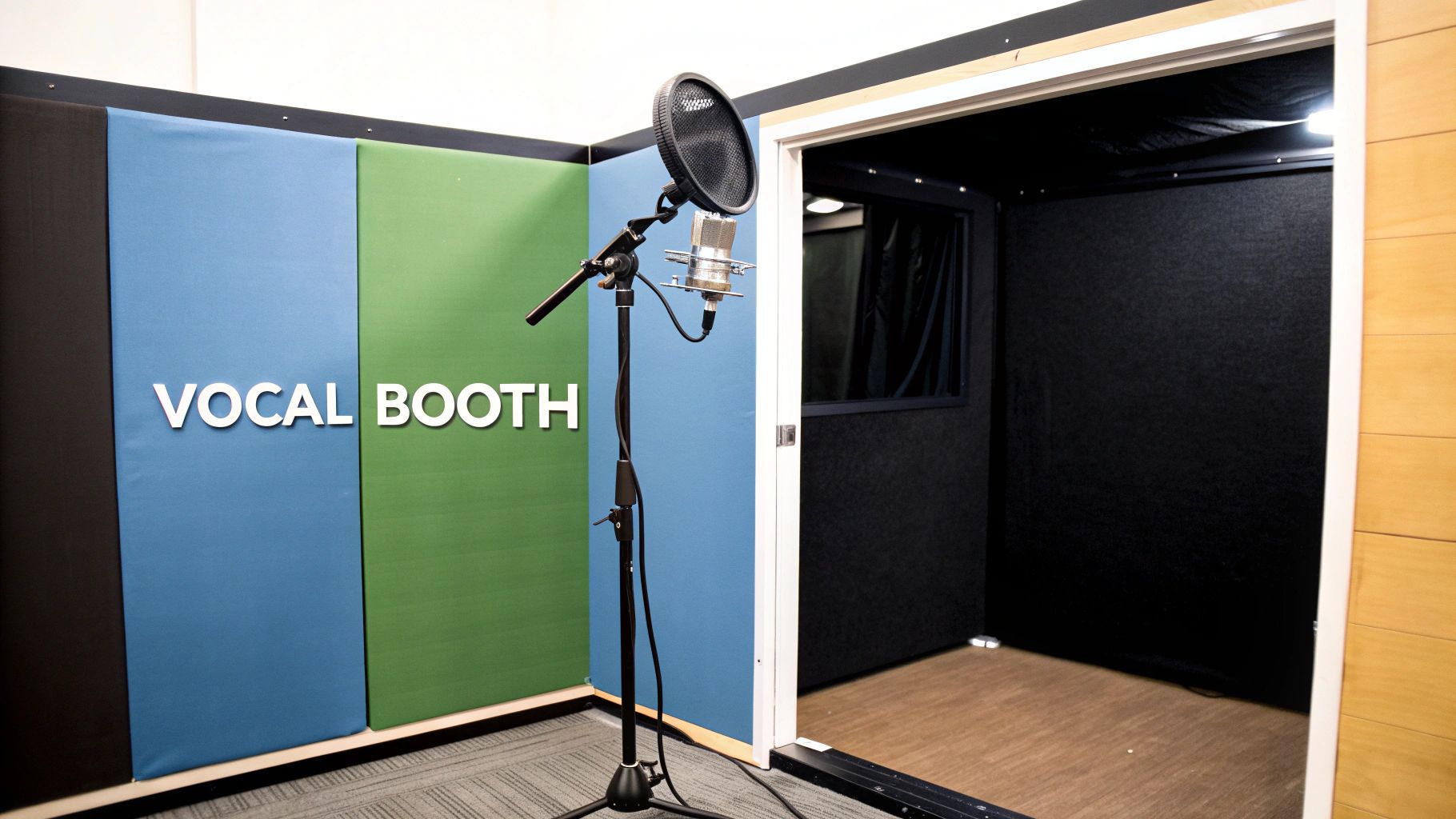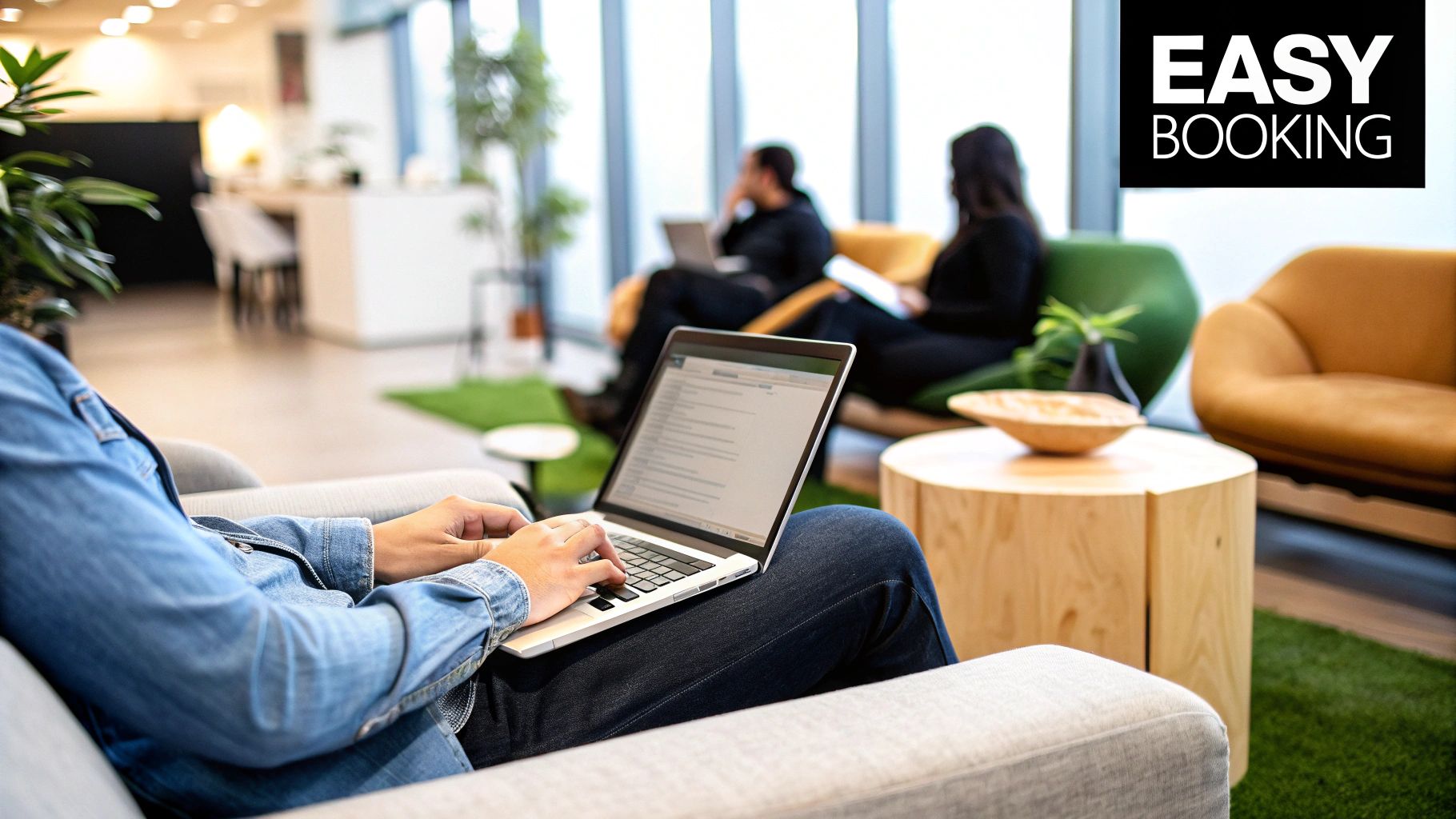Recording Studio Hire Melbourne Your Perfect Sound Awaits
- contact733797
- Aug 10, 2025
- 13 min read
So, you’re looking to hire a recording studio in Melbourne. It's a big step, and finding the right place is about so much more than just a room with a microphone. Think of it as finding a creative partner for your project. Whether you're a band ready to lay down a full album, a podcaster about to launch your first series, or a voiceover artist needing that perfectly clean read, the ideal space is waiting for you.
How to Choose the Right Melbourne Recording Studio
Picking a studio is one of the most important decisions you'll make, setting the entire tone for your project. It’s not just about the gear list; it's about the vibe, the support you get, and how well the space fits what you’re trying to achieve creatively. The whole game is about knowing exactly what you need and finding the studio that delivers it.
Let's get practical. A five-piece rock band is going to need a large live room with fantastic natural acoustics and a locker full of mics to capture every nuance. But if you're a solo artist just overdubbing vocals, your priority is a top-notch, well-isolated vocal booth and a pristine signal chain. Nailing this match from the get-go saves you a world of headaches, time, and money.
Distinguishing Between Studio Types
First things first, what kind of studio do you actually need? Are you after a full-service production house with an experienced in-house engineer to handle the technical side, or are you looking for a more flexible, DIY space where you can bring your own team and gear?
Full-Service Studios: These are brilliant for artists who want to walk in and focus entirely on their performance. They come staffed with an engineer who takes care of everything – from mic placement to running the session and often even mixing afterwards.
DIY or Dry-Hire Studios: These studios give you the keys and let you run the show. They're typically more budget-friendly and are perfect for experienced producers, artists who love the technical side, or anyone who wants to work with their own engineer for total control.
The best choice really boils down to your experience, budget, and how much creative control you want. A great studio isn't just defined by its equipment list; it’s about finding an environment where your ideas can come to life without being held back by technical hurdles.
Here's a quick checklist to help you weigh your options as you compare different studios around Melbourne.
Quick Studio Selection Checklist
Consideration | What to Look For | Why It Matters for Your Project |
|---|---|---|
Project Type | Does the studio cater to bands, solo artists, podcasters, or voiceover work? | The space, acoustics, and available gear must align with your specific recording needs. |
Equipment | Check the mic list, preamps, console, and software (Pro Tools, Logic Pro, etc.). | The right gear is crucial for capturing the sound you're after. No point booking a space that doesn't have your preferred tools. |
Engineer/Staff | Is an experienced in-house engineer included? Is staff available for setup and support? | A skilled engineer can elevate your project, while good support ensures a smooth session. |
Space & Acoustics | How large is the live room? Are there isolated booths? How does the room sound? | The physical space directly impacts the sound quality and comfort of your recording session. |
Budget | What are the hourly/daily rates? Are there package deals or dry-hire options? | Knowing your budget helps narrow down options and prevents surprise costs. |
Your Experience | Are you comfortable running a session yourself (DIY) or do you need full technical support? | This determines whether you need a full-service studio or a more hands-off dry-hire space. |
Ultimately, what you're working on will point you in the right direction. A podcaster needs a comfortable, plug-and-play setup that's simple to use. A band, on the other hand, needs a space built for powerful sound and creative collaboration.
To really get into the nitty-gritty of what makes a studio perfect for recording music, be sure to read our complete [guide to music studio hire for flawless tracks](https://www.thatcreativehub.au/post/your-guide-to-music-studio-hire-for-flawless-tracks).
Defining Your Project Needs Before You Book
Before you even start looking up recording studio hire Melbourne, the most important work happens right at your own desk. Seriously. Walking into a studio with a fuzzy idea is a recipe for wasted time and money. Having a clear blueprint of your project is your biggest advantage, transforming a vague concept into a concrete checklist.
This initial planning saves you from paying for a massive live room when you're just recording a podcast, or worse, realising the studio you booked can't handle your band's setup.
So, what are you actually doing? Are you tracking a full band live, hoping to capture that raw energy? Or are you meticulously overdubbing vocals for a pop single? Maybe you're recording a four-person podcast episode. Each of these scenarios demands something completely different from a studio. A full band needs a great-sounding live room and probably a few iso booths, while a solo vocalist just needs a top-notch vocal booth and a stellar microphone chain.
Estimating Your Studio Time
In the studio world, time is literally money. Getting your timeline right is crucial. And remember, "recording time" isn't just the time spent hitting the red button. The whole process needs to be factored in.
Setup: This is everything from loading your gear in, getting mics positioned perfectly, dialling in headphone mixes, and doing sound checks. For a simple vocal take, maybe you're good to go in 30 minutes. For a full drum kit? You could easily chew up two hours just getting sounds.
Tracking: This is the fun part—the actual recording. Be realistic here. It's always better to book a little more time and feel relaxed than to rush a performance because the clock is ticking.
Teardown and Backup: Always leave at least 30 minutes at the end. You'll need it to pack up your instruments and—this is non-negotiable—back up your session files to your own hard drive.
I’ve seen it a hundred times: artists underestimate setup and teardown. A three-hour performance can easily turn into a four or five-hour booking when you account for the whole workflow. Don't get caught out.
Identifying Your Technical Must-Haves
Once you know what you're doing and how long you'll need, it's time to get nerdy. Make a list of your absolute technical must-haves.
Do you have your heart set on the sound of a specific microphone, like a Neumann U 87 for your vocals? Is your entire project built in Pro Tools, or are you flexible enough to work with Logic Pro or Ableton Live? Getting this clarity means you'll find a studio that truly supports your creative process, rather than one that forces you into awkward workarounds.
This planning phase simplifies everything that comes next.

As you can see, knowing what gear you need is just as fundamental as finding and booking the studio itself. With this prep work done, you can start your search with the confidence that you'll find the perfect space for your sound.
Getting to Grips with Studio Gear

Looking at a studio's equipment list can feel a bit like reading a foreign language. Don't worry, you don't need to memorise every model number. What really matters is understanding how the core pieces of gear will help you capture the sound you're after.
Let's start with the basics: microphones. They're your first point of contact for capturing any sound, and you'll generally run into two main types.
Condenser Mics: Think of these as the high-definition cameras of the audio world. They’re incredibly sensitive and capture a huge amount of detail, making them perfect for vocals, acoustic guitars, and anything with subtle nuances.
Dynamic Mics: These are the rugged workhorses. They can handle loud sounds without distorting, which is why you'll see them in front of roaring guitar amps, powerful singers, and all over a drum kit.
From the mic, your sound travels through an audio interface and preamps. These are crucial bits of kit that convert the analogue signal into a digital one the computer can work with. The quality here is non-negotiable—good preamps mean a clean, professional sound. Getting this right is so important, which is why we’ve detailed some of the best options in our guide to the top 7 best microphones for home studio retailers in 2025.
The Room Is Your Most Important Instrument
Here’s a truth every seasoned engineer knows: you can have the most expensive microphone in the world, but in a bad-sounding room, you'll get a bad-sounding recording. This is where a professional Melbourne studio really earns its keep. An acoustically treated space isn't just a room with a mic in it; it's a carefully engineered environment.
With sound-absorbing panels, bass traps, and diffusers, the goal is to tame reflections and echoes. It’s about capturing the pure sound of your instrument or voice, without the room adding its own muddy character. This is the difference between a punchy, clear drum track and one that sounds like it was recorded in a garage.
This controlled environment is just as vital for mixing. Listening back on accurate studio monitors (specialised speakers) in a well-treated room means you and the engineer are hearing a true representation of the recording, which is the only way to make smart creative choices.
Mastering for a Modern Audience
These days, your music needs to sound great everywhere. The Australian recorded music market is a perfect example of this. While digital sales make up a massive 91.5% of the total market, vinyl sales recently grew by 5.6%. It’s a fascinating trend you can read more about in ARIA's latest industry report.
What does this mean for you? It means your recording studio hire in Melbourne needs to have an eye on both worlds. A top-tier studio won't just produce a track that hits hard on a Spotify playlist; they'll ensure it has the warmth and dynamic range to sound incredible on a turntable, too.
How to Make the Most of Your DIY Studio Experience at That Creative Hub

When you're looking for recording studio hire Melbourne, it's easy to focus on the gear and the space. But often, the real magic lies with the people behind the scenes. At That Creative Hub, we’re all about empowering you to create — whether you’re a seasoned pro or just starting out. Our spaces are designed to be plug-and-play, but we’re always here to support behind the scenes.
The level of support you find can vary dramatically. Some studios are purely dry-hire where you're left to your own devices. Others, like ours, are full-service creative partners ready to jump in. It all comes down to what you need to bring your vision to life.
Using the Cyclorama Studio?
Bring your own camera and crew or ask us to connect you with a trusted photographer or videographer from our network. If you’re new to lighting or unsure how to get started, we can guide you through what you need or step in with setup support. The goal is to make it easy for you to walk in and create confidently.
Podcast Studio Access
For podcast users, we offer a fully-equipped, ever-evolving set with a dedicated production manager on-site. Whether you’re filming an interview, a solo series, or a branded piece of content, we can help set the vibe and adjust the layout to suit your vision. The set is flexible, the gear is high-quality, and the support is here if you need it.
The real value here is twofold: efficiency and confidence. When a studio acts as your 'creative concierge,' they can connect you with trusted photographers, videographers, or editors from their network if you need to build out your crew. It’s like having an entire production team on speed dial.
Need Help? Just Ask
Can’t get a crew together? Let us handle it. We act as a concierge service for creators, linking you with the right people and tools to bring your vision to life. From photographers to editors, lighting setups to sound checks — we’ve got you. By choosing a studio that offers the right level of guidance, you’re setting yourself up for a session that is both incredibly productive and completely focused on what truly matters.
Working Out the Budget and Booking Your Time

Alright, let's talk money. Budgeting for studio time is a huge part of the process, and knowing how studios structure their pricing will help you get the most bang for your buck. When you start searching for recording studio hire in Melbourne, you'll quickly notice a few common ways they charge.
Most places offer a simple hourly rate. This is perfect if you just need to pop in to lay down a single vocal track or record a quick voiceover. But be warned, for bigger projects, those hours add up fast. That’s why day rates or block bookings are your best friend for anything more involved. Booking a full eight-hour day almost always works out to a cheaper hourly price.
What Does the Hire Fee Actually Cover?
Before you lock anything in, you absolutely have to ask what’s included in the price. It’s a rookie mistake not to. Typically, the standard fee gets you the room, the essential gear (think mics, monitors, and stands), and usually an in-house engineer to run the session.
But, there are always potential extras. Keep an eye out for things that might bump up the final bill:
Specialty Gear: Dreaming of using that rare vintage Neumann mic? It might cost you extra.
Additional Services: Don't assume mixing and mastering are included. They're usually separate services, as is hiring session musicians.
Going Overtime: Running over your booked slot can get expensive, fast. Always check the overtime rates beforehand.
It’s worth noting the current climate in Australia's music scene. Revenue in the industry has seen an annualised contraction of 2.1% over the past five years, a trend largely driven by the shift from physical to digital music. You can dig deeper into this data from IBISWorld. For you, this means it's a competitive market for studios, so there are good deals to be found if you know where to look.
Here’s a pro tip: always ask about package deals or off-peak discounts to stretch your budget further. A session on a Tuesday morning is often much cheaper than one on a Saturday afternoon, which could free up cash for that crucial extra hour of mixing.
And if your project is more specific, like a podcast, you're better off looking for a purpose-built space. To get the right setup from the get-go, you'll want to [find the best podcast studio Melbourne has to offer](https://www.thatcreativehub.au/post/find-the-best-podcast-studio-melbourne-has-to-offer).
Getting Ready for a Productive Studio Session
You’ve booked the studio. Now what? The real secret to a killer, stress-free recording day isn't just about showing up; it's about showing up ready. Your studio time is a finite, valuable resource, so turning your creative sparks into a concrete plan beforehand is the best way to squeeze every drop of value from your session.
For musicians, this is pretty straightforward: know your songs. I mean, really know them. Arrive with your arrangements locked down, your tempos decided, and every band member completely dialled in. For podcasters or voiceover artists, your script is your song. Have it finalised, timed, and printed out in a format that's easy to read. This isn't just about being organised; it's about creating the headspace to be creative when the red light is on.
The Pre-Session Checklist
A quick chat with the studio engineer before you arrive is always a good idea. A simple phone call or email to run through your goals for the day gets everyone on the same page from the get-go.
To make sure you can hit the ground running, here’s a quick list of what you should have with you:
Your Own Instruments and Gear: Don’t assume the studio has your favourite Strat or that specific vintage pedal you love. Bring your own guitars, pedals, and drum breakables (snare, cymbals, kick pedal). If there's a unique piece of gear that defines your sound, bring it.
Finalised Scripts or Lyric Sheets: Have physical copies. Seriously. Don't be the person scrolling through a phone, squinting at a tiny screen. Print multiple copies for yourself, the engineer, and anyone else involved.
Reference Tracks: A playlist of songs that capture the sonic vibe you're chasing is invaluable. This is the fastest way to give your engineer a clear target to aim for, saving you hours of trial and error.
A Portable Hard Drive: This is the big one. Always, always bring your own drive. The very last thing you should do before leaving is back up your session files. No exceptions.
A well-prepared session is an efficient one. You're paying to be creative, not to debate a bridge section or hunt for a phone charger. This little bit of prep is often what separates an amateur-sounding result from a truly professional recording.
Got Questions About Melbourne Recording Studios? We've Got Answers.
Finding the right recording studio in Melbourne can bring up a lot of questions. From figuring out costs to deciding if you need an engineer, here are some straightforward answers based on our experience in the industry.
What Should I Expect to Pay for Studio Time in Melbourne?
Studio hire rates in Melbourne are all over the map, and it really comes down to what you need. For a smaller podcasting setup or a basic project studio, you might be looking at around $50 to $100 per hour.
If you're aiming for a premium music studio with top-tier gear and an engineer on hand, the price naturally goes up, typically falling between $100 and $300+ per hour.
Pro Tip: If you're booking for a full day of tracking, always ask about day rates. A flat rate for an 8 or 10-hour block almost always works out cheaper than paying by the hour. It also frees you up to be creative instead of clock-watching.
Should I Bring My Own Engineer?
That really depends on you and the studio. Most professional music studios will include an in-house engineer as part of the deal. Honestly, for most artists, this is the way to go. You get to concentrate on your performance while someone who knows the room and the gear inside and out handles all the technical heavy lifting.
On the other hand, some places offer 'dry hire'. This is a great option if you're a producer or engineer yourself, or if you have a trusted collaborator you want to bring along. Just be sure to confirm this when you book so there are no awkward moments on the day.
What’s the Real Difference Between a Pro Studio and a Home Setup?
Three things: acoustic treatment, high-end equipment, and expertise. A professional studio isn't just a room with some gear; it's a purpose-built space designed for sound. Everything from the soundproofing to the wall panels is there to capture pristine, clean audio without unwanted echoes or outside noise. You also get access to a curated collection of microphones, preamps, and monitors that would cost a fortune to own.
This professional ecosystem is something the government is actively investing in. The recent launch of Music Australia, backed by $69.4 million in funding, is a huge nod to the importance of creating music in proper facilities. It underlines the critical role professional studios play in the national music scene. You can read more about the government's support for the music industry and how it’s helping artists.
Ready to book a space where creativity meets professional support? That Creative Hub offers fully-equipped music and podcast studios designed to bring your vision to life. Book your session in Melbourne today!
Comments